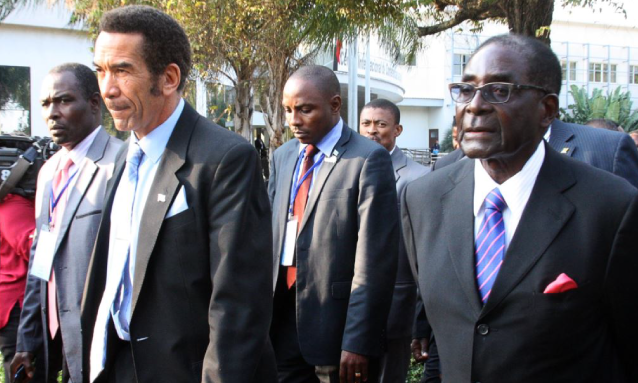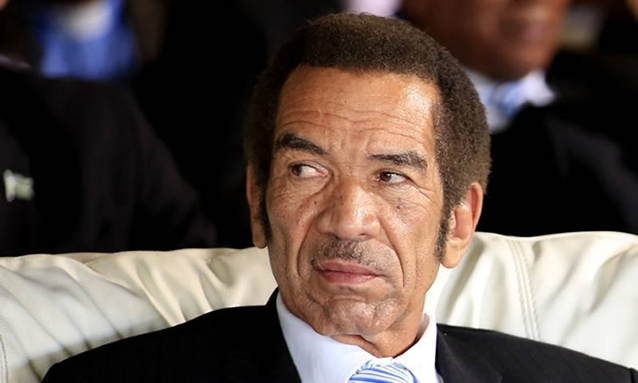
- Former Botswana president Ian Khama is plotting to make sure the Botswana Democratic Party is voted out next year.
- Khama said he was in South Africa because of persecution back home.
- He added he made a big mistake positioning Masisi to succeed him, despite warnings from Cabinet ministers.
Former Botswana president Ian Khama, a key member of the opposition Botswana Patriotic Front (BPF), says one of his biggest mistakes was paving the way for Mokgweetsi Masisi to succeed him.
Now, he is working to make sure Masisi and the ruling Botswana Democratic Party (BDP) are voted out next year to “bring back democracy” and keep away selfish leaders.
“We are human, we make mistakes. I made a big mistake because this has affected the whole country and it’s a mistake I regret. I have admitted it publicly back in Botswana.
“I have apologised to the nation for bringing this upon them and I have said that I will do my utmost to get him [Masisi] out of office in the next elections,” Khama said on the current affairs show, In Conversation with Trevor Ncube, last week.
Next year’s general elections will be for 61 National Assembly seats and local councils.
The president is elected through a double simultaneous vote whereby votes cast for National Assembly members are tallied to give the presidential result as well. Khama was interim president in 2008 and 2009 after Festus Mogae retired. He would later get his first full term in 2009, finishing his second in 2018.
For the greater part of Masisi’s first term, the two former allies have been at loggerheads. Khama accuses Masisi of using state resources to politically persecute him while there is a warrant of arrest issued for Khama back home related to the alleged illegal possession of firearms. Khama has been living in South Africa since November 2021. In the interview with Ncube, he said he was in the country because of persecution.
“I am here primarily because of persecution. In Botswana, for a long time, we thought we were immune from what we saw in some parts of the continent.
“Leaders who are driven by greed, corruption and self-interests undermine democracy, assuming that being in office or being in power is only about themselves.”
Khama called the deterioration back home, also cited by numerous think tanks and human rights defenders, a “tsunami” which had “overturned decades of democracy and the reputation we had earned ourselves as a country”.
He said anyone viewed as an associate of his back in Botswana was a marked person, adding this compromised free speech and association. Khama rolled out a script that is evident in many of Africa’s failed democracies.
“The state security has been weaponised in order to go after his [Masisi] opponents,” he said.
But Khama too was accused of intolerance during his time.
An Afrobarometer study released in the last year of his presidency said freedom of speech had plunged to its lowest level in the country’s history.
“Most Batswana see their country as a democracy, but satisfaction with the way their democracy is working has declined by 24 percentage points over the past decade from 83% in 2008 to 59%,” the report stated.
In the interview, Khama said numerous people – including some Cabinet ministers, and captains of industry – warned him about his would-be successor’s alleged traits. But he claimed he did not see the bad side of his vice president even though calls for him to fire Masisi reached his office.
“They said this man is intolerant, he’s divisive, he’s immature, and they would come to my office in ones, twos or even threes, pleading with me.”
A trusting Khama claimed that later he would invite his second-in-command and tell him what he was hearing from the ground, but Masisi had a clever way of explaining himself.
He said:
He would come with stories and everything about ‘these are probably people who want my job’ because in politics that can happen.
Caught in-between his ministers and a hated vice president, Khama held a two-day Cabinet session to address the issues raised against Masisi. But when that happened, there was an element of fear as they did not speak out. Khama said this was understandable in a cultural sense because people had to be polite to each other. But not taking a bold decision then to stop Masisi from being his natural successor was a big mistake, he added.
A look at Ian Khama’s legacy
Ever since President Masisi took over from Ian Khama back in 2018, the latter has given many an interview regarding the situation here in Botswana, mainly at the South African media’s leisure. While we do not like to get tangled in politics, we’ve curiously observed all this unfolding, with various parties rightly maintaining the ongoing feud is a stain on Botswana’s long-term reputation as the shining example of democracy in Africa. While we can draw our own conclusions as to former president Ian Khama’s motives, it’s baffling as to why South Africa persistently seems to fuel the ongoing saga.
On that basis, we thought fitting to take a walk down memory lane and although there are countless articles on the subject, the one below By Kenneth Good dated 18 April 2018 gives a broad picture of Ian Khama’s presidency.
Bad Khama: The Corruption of the Botswanan Presidency
Kenneth Good looks back at the legacy of General Ian Khama, who has just announced that he will soon step down as president of Botswana, and concludes that the best thing about his time in office is that it is now over…
The best thing about General Khama’s presidency is that after ten years, 2008-2018, it is over, at least formally speaking. Structurally, in both the economy and society, it was notable for its failures.
Unemployment nationally was already serious, standing at some 17.8%, but youth unemployment in early 2018 was 26.2%, and this was especially hurtful to women and girls, for whom joblessness reached 31.2%. Not only women, but the newly educated were hard hit.
Research by two University of Botswana lecturers revealed that some two-thirds of the unemployed are under the age of 30. Graduates had to wait ‘a minimum of 4 to 6 months’, making on average at least 13 ‘contacts’, before landing their first job. Desperation and despair could easily lead to risky sexual behaviour. Utilising Aids Impact Survey findings, two other UB lecturers found that ‘most unemployed young adults are HIV positive.’ This inter-relationship was in no sense coincidental.
Major economic decisions taken under the Khama presidency have also proved to be highly controversial. For example, the closure of the Morupule B power plant in Palapye, and its projected sale, was expected to cost the country ‘up to P20 billion’, according to Sunday Standard investigators in July 2016.[ii] The closure of the BCL copper mine announced not long after, was similarly described by that paper as ‘a catastrophic error for which this country will be paying long after Khama has gone.’ BCL constituted the life blood of Selebi Phikwe, and its closure meant the likely end of the town. Yet according to the Standard’s ‘Watchdog’ on 14 November, President Khama ‘was nowhere to be seen’. But the town’s catastrophe was not bad news for everyone: as that reporter noted, ‘some business people including some Khama associates are pitching for the purchase of BCL.’
The dominance of diamonds
These and other socio-political problems relate to the dominance of diamonds in Botswana’s undiversified economy.[iii] They are also the main source of corruption, especially elite corruption in the country. Unrecognised in the benign perceptions of visiting businesspeople, it is in fact a structural feature of the secrecy built into diamond production and distribution in the hands of the multi-national corporation, De Beers, and its local partner, Debswana. From the outset and still today, ‘the structure of mining contracts, the exact value of extracted diamonds, Botswana’s 15% shareholding in De Beers remain a closely guarded secret.’
The corporate structure of Debswana (jointly owned by Botswana and De Beers) ‘also operates through secrecy jurisdictions’ such as Luxemburg and the British Virgin Islands. Deep and pervasive political corruption flows from this nexus.
‘For a long time De Beers financed the ruling Botswana Democratic Party (BDP) through these secrecy jurisdictions.’[iv] President Ketumile Masire, and his cash-strapped farm, GM Five, benefited directly and repeatedly from De Beers financial assistance.[v] With reference to an unnamed recent study of Botswana’s diamonds, Ontebetse reports that ‘the disclosure of key information, and the removal of De Beers’ monopoly would liberate the economy and its democracy.’[vi]
The dictatorial trend
The secrecy which contributed to Sir Seretse Khama’s longevity in the presidency has only escalated under General Khama. The Mo Ibrahim Foundation noted in late 2017 how government under Ian Khama has become ‘more dictatorial and less accountable, respect for fundamental human rights is being eroded, while corruption has gone up and the justice system is becoming less effective’.

Ex-President Festus Mogae allowed in 2008 that he did not know how General Khama would rule, but he told an American TV panel recently that “the present regime does not respect the rule of law: it is inward looking”. From the outset, the Khama presidency developed into a network of personal relations with the General ‘at the centre of everything’, exercising arbitrary power with impunity, according to Kenneth Dipholo.
Nowhere was this more evident than among Botswana’s proliferating spy agencies. For a country with no known enemies, these appeared to include: the Directorate of Intelligence and Security (DIS), Military Intelligence (MI), the Security Intelligence Services, the Central Intelligence Committee, Criminal Investigations Dept, Special Branch, Diamonds and Narcotics Squad, and the Tourism Intelligence Unit.
Of these, easily the most powerful was DIS, tailored at the start of Khama’s presidency, by and for Khama, with the assistance of Colonel (now General) Isaac Kgosi. It is large, well-funded and totally unaccountable. On the 2017-2018 budget, DIS and the BDF were set to share P6.8 billion.[vii] An American scholarly analysis had earlier estimated DIS’ spending at $25, 677, 600, placing it 86th in the world among such agencies. Its personnel totalled in the thousands.[viii]
The architects of the DIS intended that the DIS was insulated from oversight. A nominal parliamentary oversight body, had never met since December 2014, and DIS never submitted a report to parliament, as was mandated in the ISS Act. It possessed in 2017 state-of-the-art electronic eavesdropping equipment enabling the agency to listen in to any form of communication. This represented ‘one of the most powerful technical capabilities in the region’. This capacity supposedly stripped Botswana’s opposition parties ‘stark naked’, and it could be what was needed to save the BDP from losing the 2019 general elections.[ix]
Rising violence
One of the most worrying phenomena to have emerged on the country’s streets is a spate of extra judicial killings. Numbers are unclear under conditions of fear and uncertainty, but the killing of John Kalafatis, on the evening of 13 May 2009, stood out: he was shot by state agents while sitting in a car in a public place. The Law Society of Botswana said: ‘The killing … showed a definite intention to kill an unarmed civilian who posed no threat.’ While inquests were once routinely held when civilians were killed, they noted, this had not happened in 9 of the 13 deaths by gunshot since Khama assumed office.
Known figures suggested then that at least 14 people had been killed between 2008 and 2010.[x] The numbers had risen further one year later, with in one case six police officers charged with killing Italy Setlampoloka on or about 29 July 2009. The overall trend is deeply concerning. Following a parliamentary question, the editor of Mmegi noted on 23 September 2011, that the ‘number of people who have gone missing … and never returned’ had reached ‘over 400’.

The Khama legacy
There is some agreement within legal and media circles about what President Khama has represented. For Dick Bayford, he was ‘nepotistic, corrupt and misuses government resources for personal and family gain’, and for the Watchdog, his governmental style was ‘reclusive, divisive, secretive and isolationist’, while he was ‘contemptuous of the media, civic society and the opposition.[xi] Over the ten years of his presidency he had not held one press conference.
Levers that protected his power and interests remained close to hand as his tenure ended. Isaac Kgosi, Director General of DIS, and a long-time ally, was due to retire, age 60, in 2018, but the President extended his position for five years, and bestowed on him the Presidential Order of Honour. Ahead of the 2019 elections, he retained his position as the BDP’s ‘Chief Campaigner’. Other military loyalists were appointed to senior posts in the Presidency and DIS.
This raises the question of how much influence Khama and his allies retain within the ruling party, despite his standing down. The president remarked more than once: “I am not going anywhere, I will still be around.”[xii]
Kenneth Good, Professor of Political Studies, University of Botswana, 1990-2005, and honorary fellow, RMIT, Melbourne.
For more on Ian Khama’s reign: https://gga.org/botswana-good-khama-bad-khama/



